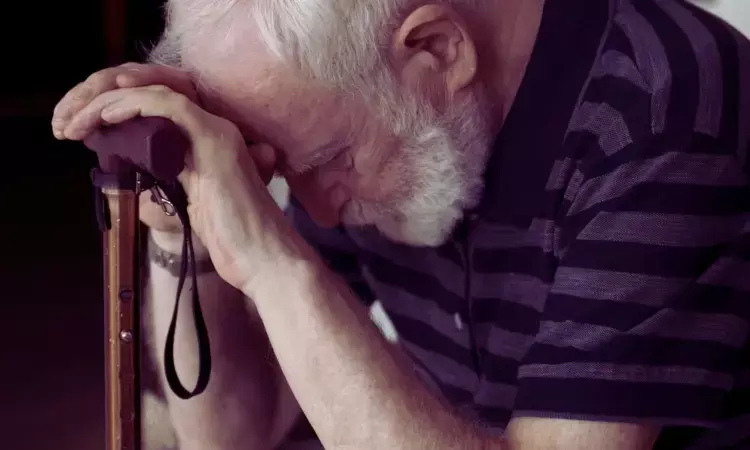- Home
- Medical news & Guidelines
- Anesthesiology
- Cardiology and CTVS
- Critical Care
- Dentistry
- Dermatology
- Diabetes and Endocrinology
- ENT
- Gastroenterology
- Medicine
- Nephrology
- Neurology
- Obstretics-Gynaecology
- Oncology
- Ophthalmology
- Orthopaedics
- Pediatrics-Neonatology
- Psychiatry
- Pulmonology
- Radiology
- Surgery
- Urology
- Laboratory Medicine
- Diet
- Nursing
- Paramedical
- Physiotherapy
- Health news
- Fact Check
- Bone Health Fact Check
- Brain Health Fact Check
- Cancer Related Fact Check
- Child Care Fact Check
- Dental and oral health fact check
- Diabetes and metabolic health fact check
- Diet and Nutrition Fact Check
- Eye and ENT Care Fact Check
- Fitness fact check
- Gut health fact check
- Heart health fact check
- Kidney health fact check
- Medical education fact check
- Men's health fact check
- Respiratory fact check
- Skin and hair care fact check
- Vaccine and Immunization fact check
- Women's health fact check
- AYUSH
- State News
- Andaman and Nicobar Islands
- Andhra Pradesh
- Arunachal Pradesh
- Assam
- Bihar
- Chandigarh
- Chattisgarh
- Dadra and Nagar Haveli
- Daman and Diu
- Delhi
- Goa
- Gujarat
- Haryana
- Himachal Pradesh
- Jammu & Kashmir
- Jharkhand
- Karnataka
- Kerala
- Ladakh
- Lakshadweep
- Madhya Pradesh
- Maharashtra
- Manipur
- Meghalaya
- Mizoram
- Nagaland
- Odisha
- Puducherry
- Punjab
- Rajasthan
- Sikkim
- Tamil Nadu
- Telangana
- Tripura
- Uttar Pradesh
- Uttrakhand
- West Bengal
- Medical Education
- Industry
Abnormal Sleep Duration One Year After Stroke Linked to Higher Depression and Poor Recovery: Study Finds

China: A new study published in Nature and Science of Sleep has found that patients with stroke or transient ischemic attack (TIA) who continue to sleep too little or too much a year after the event are at a significantly greater risk of developing post-stroke depression (PSD) and experiencing poor quality of life.
The research, led by Dr. Yang Hu and colleagues from the Department of Neurology at Beijing Tiantan Hospital, Capital Medical University, Beijing, investigated how changes in sleep duration after an acute ischemic stroke (AIS) or TIA could influence long-term mental and functional outcomes.
The team analyzed data from the China National Stroke Registry III, focusing on patients enrolled in the Impairment of Cognition and Sleep (ICONS) study. A total of 1,450 individuals with AIS or TIA, with an average age of 60.73 years, were followed for one year. Sleep duration was self-reported and categorized as short (<7 hours), normal (7–8 hours), or long (≥9 hours). Based on sleep changes, patients were grouped as follows: those with stable normal sleep, those whose sleep normalized from initially short or long durations, those who developed abnormal sleep from a previously normal pattern, and those with persistently abnormal sleep.
The key findings were as follows:
- Individuals with persistent abnormal sleep (either short or long duration) were 58% more likely to develop post-stroke depression (PSD) compared to those with stable normal sleep.
- These individuals also had a 42% higher risk of experiencing poor quality of life after one year.
- Patients whose sleep duration decreased by more than one hour were over twice as likely to suffer from moderate to severe depression.
- Participants who developed new abnormal sleep patterns during the year were nearly three times more likely to have poor functional outcomes than those whose sleep remained normal.
According to the authors, the study is among the first to explore how dynamic changes in sleep duration affect depression and recovery following AIS or TIA. The findings emphasize the importance of addressing sleep health as a part of stroke recovery programs. “Sleep duration is a modifiable factor that may offer a valuable target for interventions aimed at improving post-stroke mental and functional outcomes,” the researchers noted.
However, the study also acknowledged certain limitations. Sleep duration was assessed via self-report rather than objective measures, such as polysomnography, which may affect accuracy. The authors recommend that future studies incorporate objective sleep assessments better to understand the link between sleep patterns and stroke recovery.
The authors conclude, "Maintaining a stable and healthy sleep duration of 7–8 hours may be critical for reducing the risk of depression and enhancing recovery after a stroke or TIA. Stroke education and rehabilitation programs should incorporate sleep health awareness and provide targeted support for those at risk of abnormal sleep patterns post-stroke."
Reference:
Hu Y, Zuo L, Pan Y, Yan H, Wang Y, Zhao X. Persisting Short or Long Sleep Duration Predicts Post-Stroke Depression One year After Stroke and Transient Ischemic Attack. Nat Sci Sleep. 2025;17:1507-1519 https://doi.org/10.2147/NSS.S492838
Dr Kamal Kant Kohli-MBBS, DTCD- a chest specialist with more than 30 years of practice and a flair for writing clinical articles, Dr Kamal Kant Kohli joined Medical Dialogues as a Chief Editor of Medical News. Besides writing articles, as an editor, he proofreads and verifies all the medical content published on Medical Dialogues including those coming from journals, studies,medical conferences,guidelines etc. Email: drkohli@medicaldialogues.in. Contact no. 011-43720751


